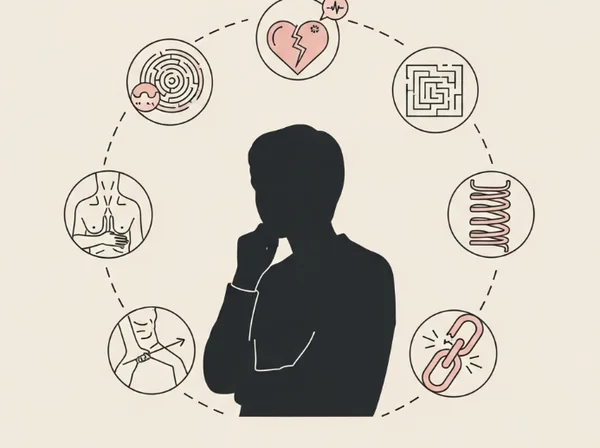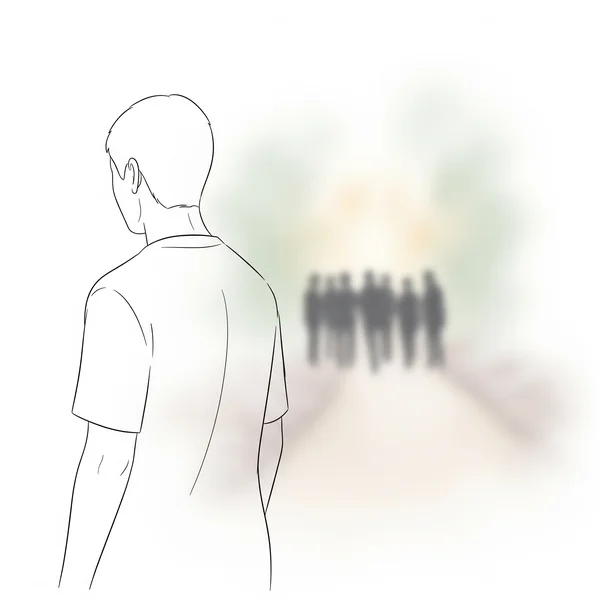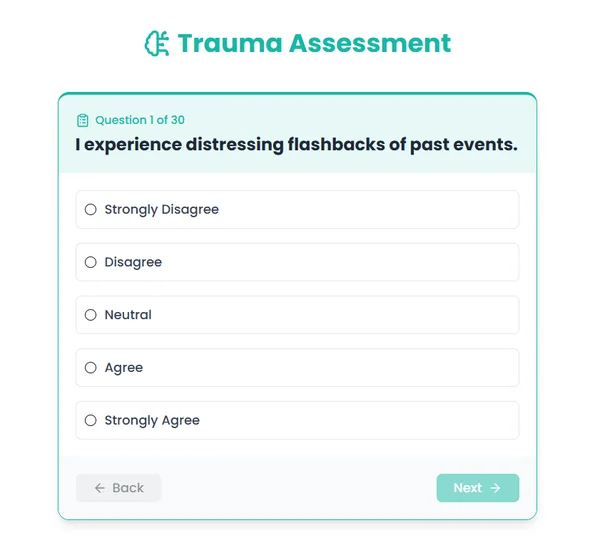Recognizing Trauma Symptoms: Signs You Shouldn't Ignore
May 23, 2025 | By Nora Hayes
Do you find yourself struggling with persistent feelings or behaviors that you can't quite explain? Sometimes, experiences from our past can cast long shadows, manifesting as various trauma symptoms that impact our daily lives. What are common signs of trauma? Recognizing these indicators is the first crucial step towards understanding and healing. This article will guide you through common emotional, cognitive, physical, and behavioral signs of trauma, and explain how a free trauma test at TraumaTest.org can offer initial clarity.

Emotional Signs of Trauma: Beyond Just Sadness
Emotional responses are often the most readily apparent trauma symptoms, though they can be complex and varied. What are emotional trauma symptoms?
Intense Fear, Anxiety, and Panic Attacks
A pervasive sense of fear or dread, even in safe situations, can be a significant sign. This might escalate into generalized anxiety or sudden, overwhelming panic attacks, which are common PTSD symptoms.
Persistent Sadness, Hopelessness, or Depression Symptoms
While sadness is a natural human emotion, prolonged and profound sadness, a feeling of hopelessness about the future, or other depression symptoms can be linked to unresolved trauma. These feelings might seem to come out of nowhere or be disproportionate to current events.
Irritability, Anger Outbursts, and Mood Swings
Difficulty managing anger, frequent irritability, or sudden and intense mood swings can also be emotional signs of trauma. You might find yourself overreacting to minor stressors, a sign your nervous system is on high alert.
Numbness, Detachment, or Difficulty Feeling Emotions
Conversely, some individuals experience emotional numbing or a feeling of detachment from their own emotions or from others. This can manifest as an inability to feel joy, love, or even sadness, and is a way the mind sometimes copes with overwhelming experiences. This could be one of the trauma symptoms you explore with an online trauma assessment.
Cognitive & Mental Trauma Symptoms: Impact on Thoughts & Memory
Trauma doesn't just affect our feelings; it can significantly impact our thought processes and memory. What are cognitive signs of trauma?
Intrusive Thoughts, Flashbacks, and Nightmares (Key PTSD Symptoms)
These are hallmark PTSD symptoms. Intrusive thoughts are unwanted, distressing memories or images that suddenly appear. Flashbacks are more intense, making you feel as though you are reliving the traumatic event. Nightmares related to the trauma are also common.

Difficulty Concentrating and Memory Problems
Trouble focusing, making decisions, or remembering important details (even those unrelated to the trauma) can be significant trauma symptoms. This "brain fog" can be frustrating and impact daily functioning.
Negative Self-Perception and Excessive Guilt or Shame
Trauma can distort how you see yourself, leading to persistent feelings of worthlessness, or excessive guilt and shame, even if you were not at fault for the traumatic event. These are important signs of trauma to recognize.
Confusion, Disorientation, or Feeling Disconnected from Reality
Some individuals may experience periods of confusion, disorientation, or a sense of unreality (derealization) or feeling detached from their own body (depersonalization). These dissociative symptoms can be coping mechanisms triggered by overwhelming stress.
Physical Symptoms of Trauma: The Body Remembers
The adage "the body keeps the score" is true; trauma often manifests physically. What are physical symptoms of trauma?
Chronic Fatigue, Sleep Disturbances (Insomnia or Hypersomnia)
Persistent exhaustion that isn't relieved by rest, or significant sleep disturbances like insomnia (difficulty falling/staying asleep) or hypersomnia (sleeping too much), are common physical symptoms of trauma.
Unexplained Aches, Pains, and Muscle Tension
Chronic muscle tension, headaches, back pain, or other unexplained aches and pains can be physical manifestations of ongoing stress and hyperarousal linked to trauma.
Heightened Startle Response and Being Easily Agitated
An exaggerated startle response to sudden noises or movements, or feeling constantly "on edge" and easily agitated, are physiological signs of trauma indicating an overactive fight-or-flight system.
Digestive Issues and Changes in Appetite
Stress and trauma can significantly impact the digestive system, leading to issues like irritable bowel syndrome (IBS), nausea, or significant changes in appetite (either overeating or loss of appetite). Our trauma quiz may touch upon some of these areas.
Behavioral Signs of Trauma: Changes in Actions & Reactions
Trauma can also lead to noticeable changes in behavior and how we interact with the world. What are behavioral signs of trauma?
Avoidance of People, Places, or Activities (Linked to PTSD Symptoms)
Actively avoiding anything that reminds you of the traumatic event – specific people, places, conversations, or activities – is a common behavioral symptom, particularly in PTSD symptoms.

Social Withdrawal and Isolation
Pulling away from friends, family, and social activities, leading to increased isolation, can be a significant behavioral change after trauma. This can stem from a lack of trust, feeling misunderstood, or emotional numbness.
Increased Substance Use or Other Risky Behaviors
Some individuals may turn to alcohol, drugs, or other risky behaviors (e.g., reckless driving, impulsive spending) as a way to cope with or numb the distressing trauma symptoms.
Being Overly Guarded or Difficulty Trusting Others
Trauma, especially interpersonal trauma, can severely damage one's ability to trust others, leading to being overly guarded, suspicious, or having difficulty forming close, secure relationships.
How a Free Trauma Test Can Help Identify These Symptoms
If you recognize several of these signs of trauma in yourself, it can feel overwhelming. How do I know if I have ptsd or other trauma symptoms? A free trauma test can be a valuable, non-intrusive first step in making sense of your experiences.
What Our Online Trauma Assessment Covers
The online trauma assessment at TraumaTest.org includes questions designed to touch upon these various emotional, cognitive, physical, and behavioral trauma symptoms. It provides a structured way to reflect on your experiences.
Understanding Your Results: A First Step to Awareness
The results of a trauma quiz are not a diagnosis, but they can provide a preliminary indication of whether your symptoms align with common patterns seen in individuals who have experienced trauma. This awareness is a crucial first step.
Anonymity and Taking the Test at Your Own Pace
Our free trauma test is anonymous and can be taken at your own pace, in the privacy of your own space, allowing for honest self-reflection without pressure.

Recognizing Symptoms is Key: Take a Free Trauma Test Today
Recognizing these varied trauma symptoms is a significant and courageous step towards understanding yourself better. If many of these signs of trauma resonate with you, or if you're experiencing distressing stress disorder symptoms, remember that you're not alone and help is available. Taking a free trauma test can provide initial insights and empower you to consider the next steps on your journey to well-being.
Are there any trauma symptoms listed here that surprised you, or that you hadn't previously connected to past experiences? Share your general thoughts in the comments below – your reflections might help others feel less alone. Click here to take our free trauma test and begin your path to understanding.
Common Questions About Trauma Symptoms and Testing
-
Can trauma symptoms appear years after an event?
Yes, absolutely. It's very common for trauma symptoms or even full-blown PTSD symptoms to emerge months or even years after the traumatic event. This is known as delayed-onset PTSD. Sometimes, a later life event can trigger unresolved trauma from the past.
-
Is it possible to have trauma symptoms without having PTSD? Yes. You can experience various signs of trauma without meeting the full diagnostic criteria for PTSD. Trauma affects individuals differently. Understanding these symptoms through a trauma test can still be beneficial for self-awareness and seeking support, even if you don't have a formal PTSD diagnosis.
-
What's the difference between stress and trauma symptoms?
While both involve a response to a stressor, trauma symptoms are typically more intense, persistent, and disruptive to daily life than everyday stress. Trauma often involves a perceived threat to life or safety, leading to more profound and lasting psychological, emotional, and physical changes. Everyday stress is usually more transient.
-
How accurate is an online free trauma test for identifying symptoms?
An online free trauma test, like the one at TraumaTest.org, is a screening tool designed to help you identify potential trauma symptoms based on your self-reported experiences. It can be quite "accurate" in terms of reflecting what you report, but it is not a diagnostic tool and cannot replace a professional clinical assessment for accuracy in diagnosis.
-
If I recognize some of these signs of trauma, what should I do next?
If you recognize several signs of trauma and they are causing you distress or interfering with your life, the most important next step is to consider speaking with a mental health professional. They can provide a proper assessment, diagnosis if appropriate, and guide you towards effective treatment and coping mechanisms. Taking our trauma quiz can be a good way to gather your thoughts before such a consultation.